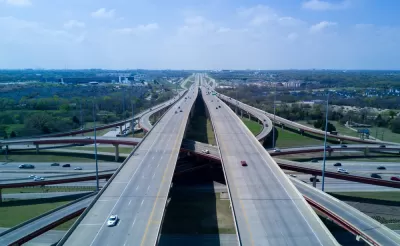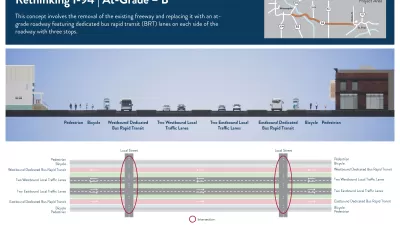Ten recommendations for effective freeway removal advocacy.

Writing in Strong Towns, Jay Arzu outlines 10 recommendations for “aspiring freeway fighters” who want to support highway removal initiatives.
First, Arzu emphasizes focusing on neighborhood reconnection and reinvestment as a key goal. “These areas will be affected the most by the deconstruction of the highway, and residents could be displaced if the area becomes too desirable. To mitigate the issues these communities will face, they must be partners from the start of the project, not the middle, and certainly not to check off a box.” The second recommendation also stresses the importance of community input and equity in the planning and implementation process.
Other recommendations include reducing focus on traffic data (which typically favors keeping highways), aligning design with the city’s existing street grid, providing ample visual representations of what the neighborhood could look like without the freeway, and working with local land banks. Steutenville also encourages freeway fighters to become involved in local transportation planning efforts as professionals and elected officials. “In the future, our State DOTs must operate with a deeper focus on eliminating vehicle miles traveled, reconnecting communities, and improving pedestrian safety.”
Ultimately, Arzu points out, “no highway is permanent!” Successful projects have already been undertaken in several cities, showing that reversing the highway-building trend and starting to heal the scars left on urban neighborhoods is possible.
FULL STORY: 10 Recommendations for Freeway Fighters

Planetizen Federal Action Tracker
A weekly monitor of how Trump’s orders and actions are impacting planners and planning in America.

San Francisco's School District Spent $105M To Build Affordable Housing for Teachers — And That's Just the Beginning
SFUSD joins a growing list of school districts using their land holdings to address housing affordability challenges faced by their own employees.

The Tiny, Adorable $7,000 Car Turning Japan Onto EVs
The single seat Mibot charges from a regular plug as quickly as an iPad, and is about half the price of an average EV.

Seattle's Plan for Adopting Driverless Cars
Equity, safety, accessibility and affordability are front of mind as the city prepares for robotaxis and other autonomous vehicles.

As Trump Phases Out FEMA, Is It Time to Flee the Floodplains?
With less federal funding available for disaster relief efforts, the need to relocate at-risk communities is more urgent than ever.

With Protected Lanes, 460% More People Commute by Bike
For those needing more ammo, more data proving what we already knew is here.
Urban Design for Planners 1: Software Tools
This six-course series explores essential urban design concepts using open source software and equips planners with the tools they need to participate fully in the urban design process.
Planning for Universal Design
Learn the tools for implementing Universal Design in planning regulations.
Smith Gee Studio
City of Charlotte
City of Camden Redevelopment Agency
City of Astoria
Transportation Research & Education Center (TREC) at Portland State University
US High Speed Rail Association
City of Camden Redevelopment Agency
Municipality of Princeton (NJ)





























